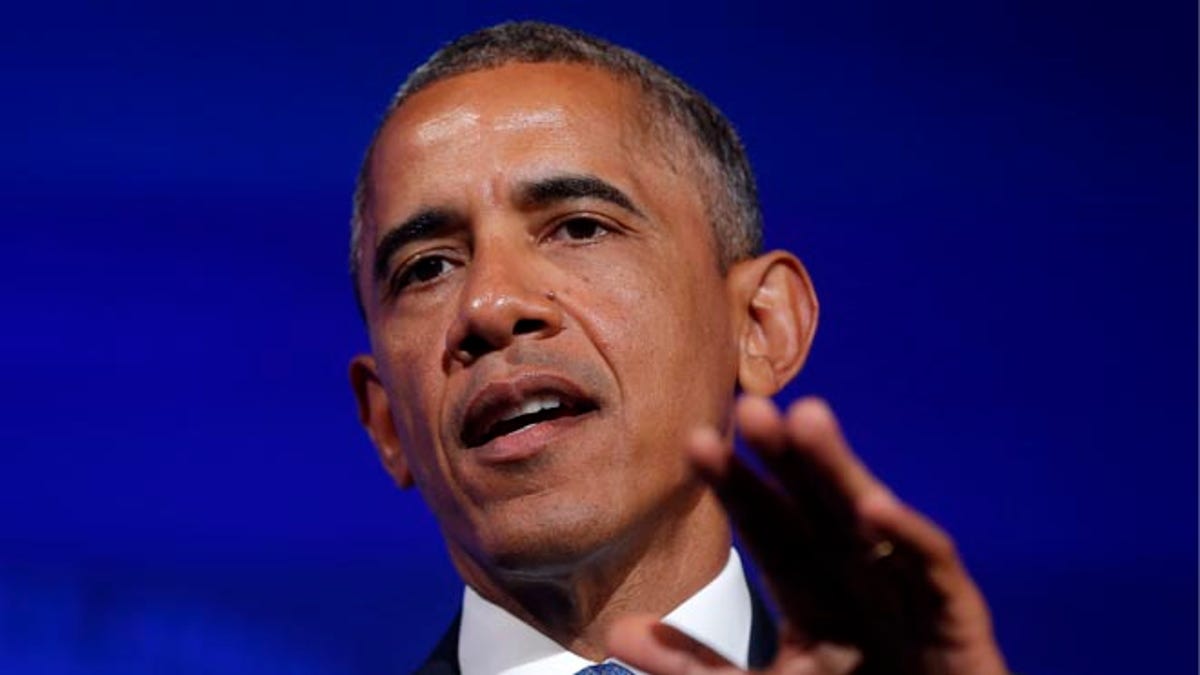
FILE: Aug. 5, 2014; President Obama speaks at the U.S. Africa Business Forum, in Washington, D.C. (AP)
With Congress on August recess after failing to agree on a plan to help fix the country’s pressing immigration problems, President Obama is poised to take matters in his own hands with executive actions.
Whether the president will act without Congress on immigration and other pressing issues has as emerged as a thorny political question.
Critics argue he is intent on violating the Constitution to achieve his political agenda, while supporters say he is being forced into action because of the Capitol Hill dysfunction.
Speculation that Obama will act during August recess is not unfounded.
He has issued at least eight significant executive actions during August recess in the past four years -- including two in August 2013 on gun control.
House Republicans -- who have already voted to file a lawsuit arguing the president has overstepped his authority on ObamaCare -- worry his first move this August will be to expand his 2012 executive order that defers deportation for many young immigrants already in the United States illegally.
The president has made clear he will act without Congress on the crisis at the southern U.S. border where thousands of mostly unaccompanied Central American youths are entering the country illegally.
However, the White House also appears to be sending a mixed message since Congress left town about how and when Obama will act.
“I’m going to have to act alone because we don’t have enough resources. We’ve run out of money,” Obama said last week, then hedged by saying the move might merely be reallocating existing resources.
A day earlier, White House senior adviser Dan Pfeiffer tweeted: “By pulling their own [immigration-related] bill, the House GOP once again proves why the President must act on his own to solve problems.”
The criticism proved premature, considering the House later passed legislation that includes $694 million to help deal with the current immigration crisis. And by Sunday, Pfeiffer was backing off his go-it-alone push.
He said talk about Obama acting immediately was “uniformed speculation,” arguing that the departments of Justice and Homeland Security have yet to provide him with the legal guidance and other information needed before taking action.
However, Pfeiffer remained ambiguous about when Obama would act, saying only it will be “at the end of summer” -- which unofficially ends Sept. 1, Labor Day, and officially ends Sept. 21.
“Let’s wait and see,” he told ABC.
Obama addressed the issue again on Wednesday, saying he would “scour over” U.S. laws and regulations to see what authority he has to continue issuing executive orders but argued he has never had a “green light” to violate the Constitution or White House powers.
Those who suspect Obama will likely issue an executive order over Congress’ five-week break think that will likely happen during the middle of the first family’s vacation on Martha’s Vineyard in Massachusetts, when he returns to Washington Aug. 17-19 to White House meetings on undisclosed matters.
In addition to the immigration issue, Obama could also take action to stop U.S. companies from establishing overseas headquarters to avoid federal taxes -- a situation that Congress also has not resolved legislatively.
Leaders of the Democrat-controlled Senate suggest they will have a proposed fix in September but are asking Obama to take action now to stop the corporate tax dodge -- known as “inversion.”
“We urge you to use your authority to reduce or eliminate tax breaks associated with inversions,” Democratic Sens. Dick Durbin, Ill., Jack Reed, R.I., and Elizabeth Warren, Mass., wrote in a letter Tuesday to Obama. “Inverted corporations take advantage of all the things American tax dollars provide … . Yet these companies claim to be foreign corporations when it’s time to pay their tax bill.”
The next day, the Treasury Department made clear the administration is indeed considering acting alone.
“There are limits to what Treasury can do without action by Congress,” an agency spokesperson said. “Nonetheless, Treasury is reviewing a broad range of authorities for possible administrative actions that could limit the ability of companies to engage in inversions.”
Obama’s 2012 executive order deferred deportation for roughly a half million young illegal immigrants brought in the U.S. by their parents.
But his next executive action reportedly could extend delayed deportation to as many as 5 million illegal immigrants, including adults who knowingly came to the U.S.
Such a move could be politically risky for fellow Democrats with Election Day about 10 weeks out.
Just 31 percent of Americans approve of the president’s handling of the immigration issue, according to a June 20 Gallup poll.
Obama continues to point out that he taken fewer executive actions than any of the past three presidents -- one Democrat and two Republicans. And he argues the best and long-term solutions can be achieved only by passing legislation.
“Get things done,” he told Congress last week.












































